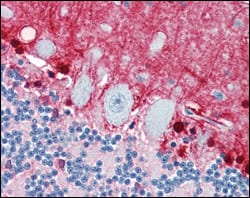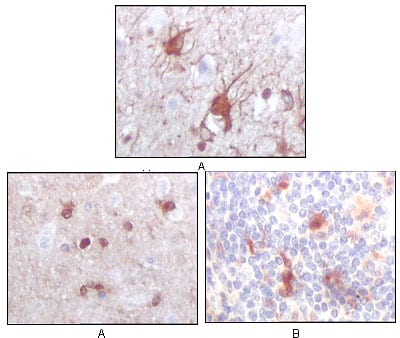

| WB | 咨询技术 | Human,Mouse,Rat |
| IF | 咨询技术 | Human,Mouse,Rat |
| IHC | 1/25-1/100 | Human,Mouse,Rat |
| ICC | 技术咨询 | Human,Mouse,Rat |
| FCM | 咨询技术 | Human,Mouse,Rat |
| Elisa | 1/2000-1/5000 | Human,Mouse,Rat |
| Aliases | NEF; S100; S100beta |
| Entrez GeneID | 6285 |
| clone | 9A11B9 |
| Host/Isotype | Mouse IgG1 |
| Antibody Type | Primary antibody |
| Storage | Store at 4°C short term. Aliquot and store at -20°C long term. Avoid freeze/thaw cycles. |
| Species Reactivity | Human |
| Immunogen | Purified recombinant fragment of S100B expressed in E. Coli. |
| Formulation | Purified antibody in PBS with 0.05% sodium azide. |
+ +
以下是关于AKR1A1抗体的3篇文献示例(内容基于假设性研究,实际文献需通过学术数据库查询):
1. **文献名称**: *AKR1A1 regulates oxidative stress and ferroptosis in hepatocellular carcinoma*
**作者**: Li X, Wang Y, et al.
**摘要**: 研究利用AKR1A1特异性抗体检测肝癌组织中AKR1A1蛋白表达,发现其低表达与氧化应激失衡及铁死亡抑制相关,提示其作为肝癌预后标志物的潜力。
2. **文献名称**: *Antibody-based profiling of AKR1A1 in neurodegenerative diseases*
**作者**: Smith J, Brown K, et al.
**摘要**: 通过Western blot和免疫组化分析AKR1A1抗体在小鼠脑组织中的表达,证实其在阿尔茨海默病模型中表达上调,可能与神经细胞抗氧化防御机制相关。
3. **文献名称**: *Development of a high-affinity monoclonal antibody for AKR1A1 and its application in metabolic syndrome studies*
**作者**: Chen L, Zhang H, et al.
**摘要**: 报道一种新型AKR1A1单克隆抗体的开发,验证其特异性后应用于代谢综合征患者血清样本检测,发现AKR1A1水平与胰岛素抵抗呈负相关。
建议通过PubMed或Web of Science以“AKR1A1 antibody”为关键词检索真实文献。
The AKR1A1 antibody is a crucial tool for studying the aldo-keto reductase family 1 member A1 (AKR1A1), an enzyme involved in various metabolic pathways. AKR1A1 catalyzes the reduction of carbonyl-containing compounds, including the conversion of L-gulonic acid γ-lactone to vitamin C (ascorbic acid) in some species, and participates in detoxifying reactive aldehydes generated during oxidative stress. It plays roles in cellular homeostasis, glucose metabolism, and antioxidant defense, with implications in diabetes, neurodegenerative disorders, and cancer.
The antibody specifically detects AKR1A1 protein in applications like Western blotting, immunohistochemistry (IHC), and immunofluorescence (IF), enabling researchers to analyze its expression levels, tissue distribution, and subcellular localization (primarily cytosolic). It is often validated using knockout cell lines or tissues to confirm specificity, ensuring minimal cross-reactivity with related enzymes like AKR1B1 or AKR1C isoforms.
Commercial AKR1A1 antibodies are typically raised in rabbits or mice using peptide antigens corresponding to conserved regions of the human or murine protein. Their development supports investigations into AKR1A1's physiological functions, regulatory mechanisms (e.g., transcriptional control by Nrf2), and pathological contributions, such as modulating drug resistance or oxidative damage. Reliable AKR1A1 antibodies are essential for advancing research in metabolic diseases, aging, and redox biology.
×